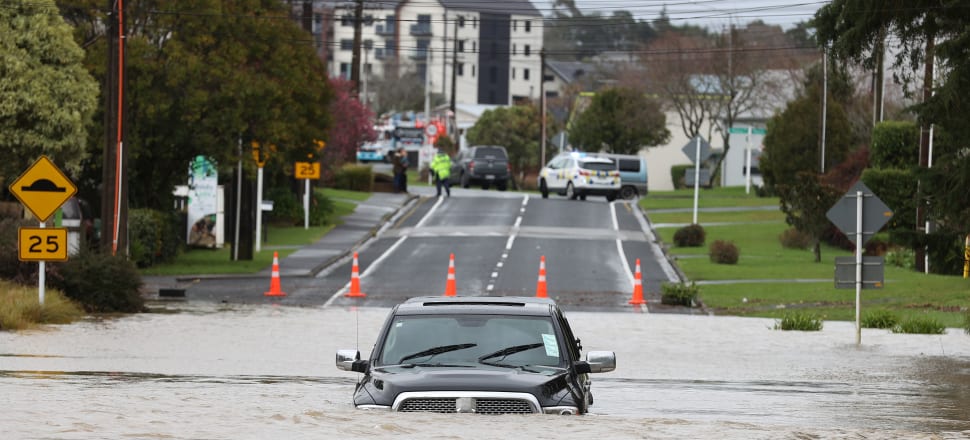
Auckland's extreme summer of weather has pushed out the plan to allow multi-storey housing metro-wide, and could inspire new approaches to handling stormwater
Auckland Council has won a one-year extension from the Government on hearings to determine new housing intensification rules across the city – but been told to restrict concrete driveways and carports and plan for a 'sponge city'.
The January and February extreme storms – and the need for investigations into housing in at-risk flooding zones – led to Environment Minister David Parker's agreement to the council's request for a 12-month extension. An independent hearings panel is already examining what council exemptions to approve under a new, cross-party housing density law.
Parker's letter granting the delay means the panel will now have to re-schedule its work. It notified affected parties of the minister's delay decision on Thursday.
The minister agreed the council could "undertake natural hazard and flooding investigations work and formulate a planning response" over the next year, before the hearings panel makes findings on the density issues.
"I acknowledge that Auckland Council is facing a number of challenges following the significant flooding and landslides caused by extreme weather during Auckland Anniversary weekend and Cyclone Gabrielle," Parker wrote to councillor Angela Dalton, the deputy chair of the planning committee. "I understand why, in these circumstances, a further year is needed."
But he took the opportunity of the 12-month extension to lay out his own demands on the council.
"I expect this scope to include a review of the council's approach to intensification in non-floodable areas and the development of blue green corridors in flood-prone areas.
"Taking a water-sensitive design ('sponge city') approach to urban development will enable better management of local and catchment-wide flood risk..."
Recommending the council consider the findings of the Parliamentary Commissioner for the Environment report 'Are we building harder, hotter cities?', he made it clear Auckland would need to intensify with plenty of green spaces.
"I concur with the concerns raised about the amount and quality of reserve and open spaces being provided in both existing urban areas and greenfield developments."
His advice doesn't stop there.
Parker tells the council to consider using stronger existing controls under the Auckland Unitary Plan to soften developments – "to prevent large impermeable areas such as driveways, carpads and terraces in new and existing sites."
While some Auckland councillors have suggested the flooding and overwhelmed infrastructure mean the city should pause the high intensification plans, Parker makes it clear improving two things at once is the central government goal.
"The Government is committed to both improving housing affordability and ensuring our cities are resilient."
He argues two central government planning instruments since 2020 – on urban development and medium density residential standards – are still in their early days. "So it is very unlikely that development enabled by these instruments had any effect on the floods."
Parker writes that some "recent development at density" by the state housing provider Kainga Ora in Auckland – with well designed stormwater infrastructure – had performed well in the floods.
In granting the extension the minister also says he expects Auckland Council to "prioritise planning decisions that improve housing affordability" with more people living and working near centres and public transport and with decent infrastructure.
And he throws one more challenge into the council's 12 months of additional time on the housing plan, known as Plan Change 78: To complete a housing intensification plan for the new Auckland Light Rail route "within the same timeframes".
"My expectation is that the planned variation to Plan Change 78 will be a comprehensive variation that will support the urban development outcomes that the Crown and council are seeking to deliver through investment in Auckland Light Rail."
Auckland Mayor Wayne Brown had predicted if ministers did not grant an extension they might find the public wouldn't grant them an extension of their time in office after the October election. "The last month does change things and it would be a foolish group to oppose that we go through this carefully and fully," he told councillors.
Plan Change 78 arose from the cross-party law from late 2021 when National joined Labour in pushing for sweeping changes to existing plans for the country's major urban areas – and effectively overrode the Auckland Unitary Plan. Agreed in 2016, that plan had in itself made radical provisions for higher building zones and more housing density in the city to cope with 20 to 30 years of growth. It stands criticised for allowing building in flood plains.







